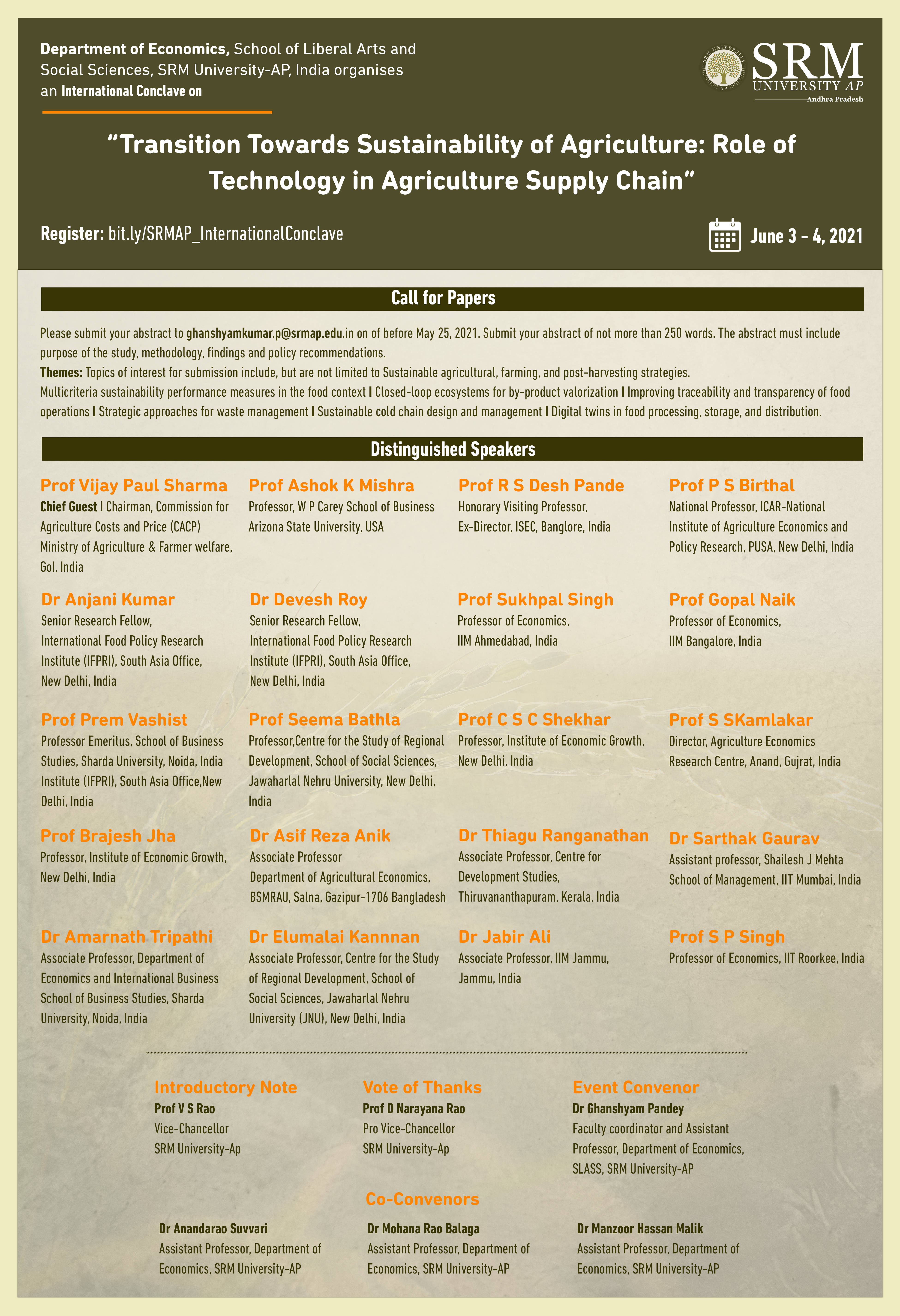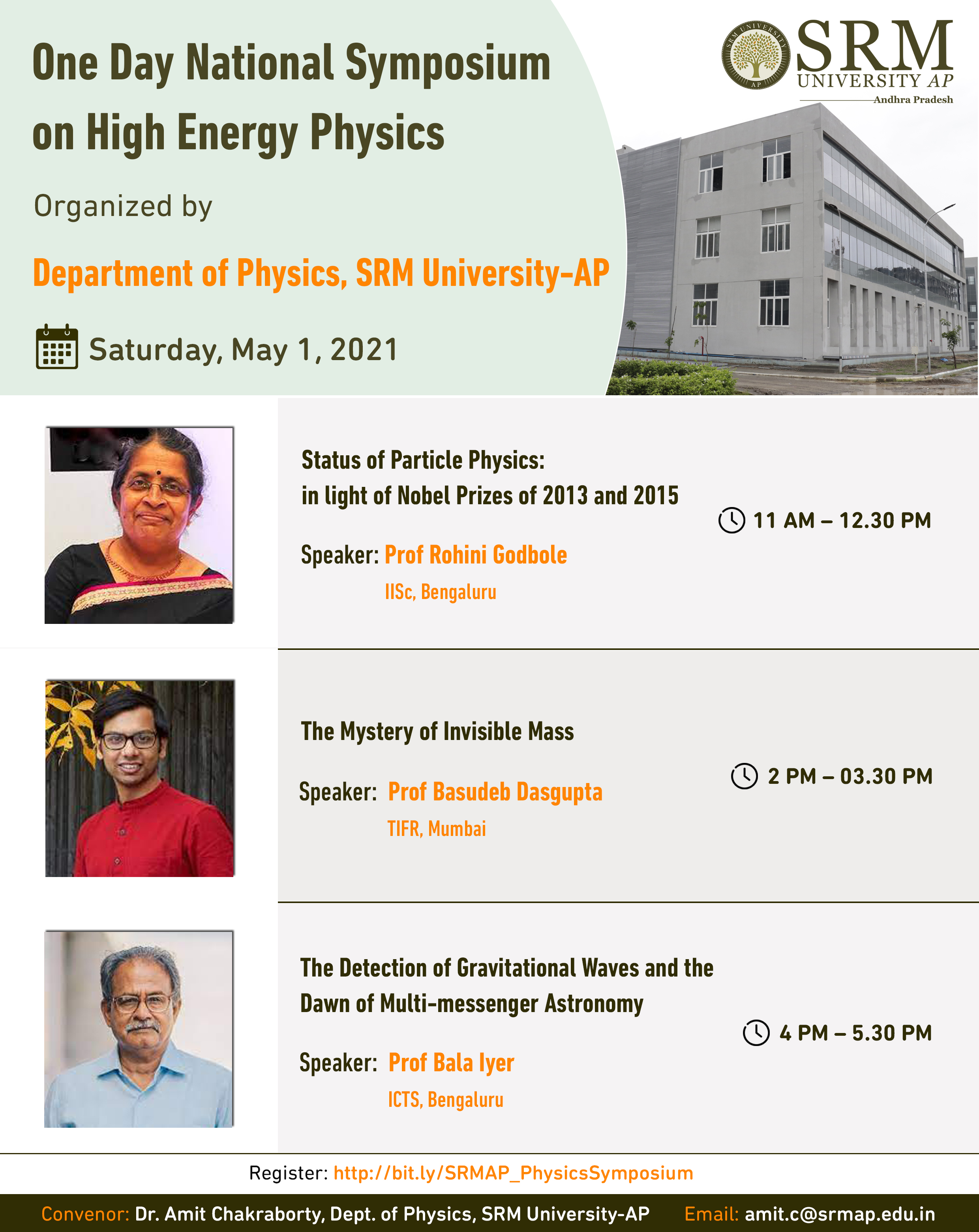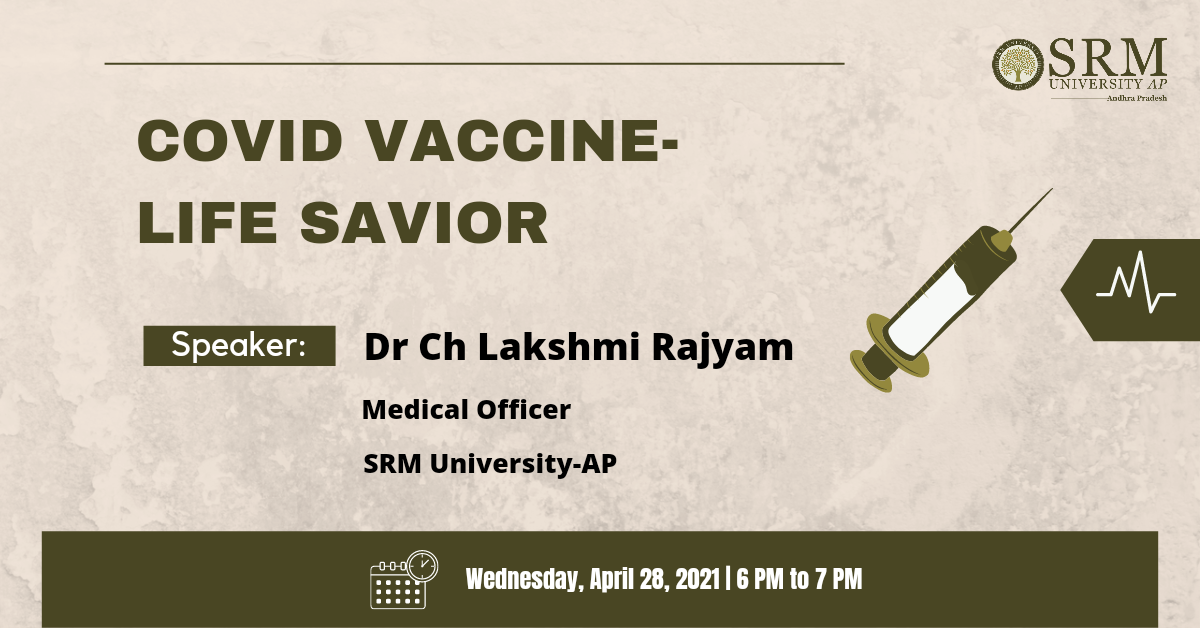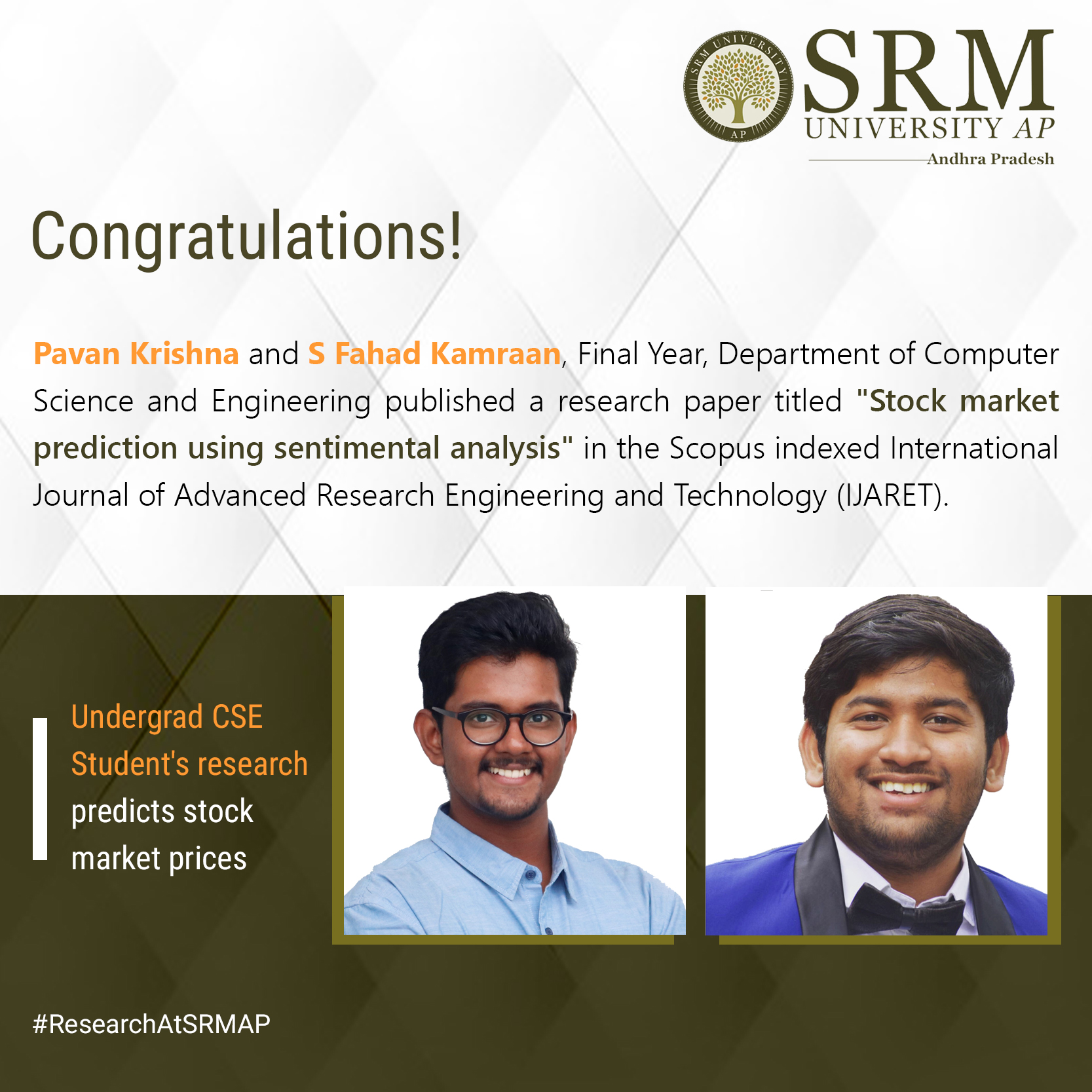- Dr Javid Ahmad Dar April 30, 2021
- International Conclave on the Role of Technology for the Sustainable Agricultural Growth for Future Generations April 29, 2021
 An International Conclave on the “Transition towards sustainability of Agriculture: Role of Technology in Agriculture Supply Chain” is being organised by the Department of Economics, School of Liberal Arts and Social Sciences, SRM University-AP, Andhra Pradesh on June 3-4 from 9 am. Renowned economists and experts across the world will be joining the conclave to share their thoughts and perspectives on the much-needed topic of this time. Faculty and Scholars are invited to submit the abstracts of their research papers on or before May 25, 2021. Prof Vijay Paul Sharma, Chairman, Commission for Agriculture Costs and Price (CACP) Ministry of Agriculture & Farmer Welfare, Govt of India, will grace the conclave with his presence as the Chief Guest.
An International Conclave on the “Transition towards sustainability of Agriculture: Role of Technology in Agriculture Supply Chain” is being organised by the Department of Economics, School of Liberal Arts and Social Sciences, SRM University-AP, Andhra Pradesh on June 3-4 from 9 am. Renowned economists and experts across the world will be joining the conclave to share their thoughts and perspectives on the much-needed topic of this time. Faculty and Scholars are invited to submit the abstracts of their research papers on or before May 25, 2021. Prof Vijay Paul Sharma, Chairman, Commission for Agriculture Costs and Price (CACP) Ministry of Agriculture & Farmer Welfare, Govt of India, will grace the conclave with his presence as the Chief Guest.The agriculture and food sectors are facing multiple challenges. With the global population projected to grow from 7.6 billion in 2018 (UN DESA, 2019) to over 9.6 billion in 2050, there will be a significant increase in the demand for food (UN DESA, 2017). At the same time, the availability of natural resources such as fresh water and productive arable land is becoming increasingly constrained. Production is not the only concern; although agricultural output is currently enough to feed the world, 821 million people still suffer from hunger (FAO, 2018). Processes such as the rapid rate of urbanisation also have important implications for food production patterns and consumption. The agri-food sector remains critical for livelihoods and employment. There are more than 570 million smallholder farms worldwide (Lowder et al., 2016), and agriculture and food productions account for 28% of the entire global workforce (ILOSTAT, 2019).
Achieving the UN Sustainable Development Goal of a ‘world with zero hunger’ by 2030 will require more productive, efficient, sustainable, inclusive, transparent and resilient food systems. This will require an urgent transformation of the current agri-food system. Digital innovations and technologies may be part of the solution. The so-called ‘Fourth Industrial Revolution’ (Industry 4.0) observes several sectors to be transformed rapidly by ‘disruptive’ digital technologies such as Blockchain, Internet of Things, Artificial Intelligence and Immersed Reality. In the agriculture and food sectors, the spread of mobile technologies, remote-sensing services and distributed computing are already improving smallholders’ access to information, inputs, market, finance and training. Digital technologies are creating new opportunities to integrate smallholders into a digitally-driven agri-food system. In this two-day Internation Conclave, reputed experts will shed some light by sharing their wisdom with others on the recent challenges and the scope associated with it. Needless to say, food will always be an integral part of the basic need of humans. In these discussions, the path towards ensuring enough food supply for future generations will be searched.
The Department of Economics, under the School of Liberal Arts and Social Sciences at SRM University-AP, is a vibrant unit for teaching fundamental courses (core & electives) in Economics along with allied courses for students across the disciplines. In addition to the Foundation Courses and optional Minors across the departments, the department ensures that the education imparted is truly multidisciplinary with an excellent programme structure that can cater to the growing market demand for professional economists and policy researchers. At Present, the department offers B.Sc. (Hons.) and PhD in Economics and will soon offer a postgraduate programme with specialisations in Econometrics, Finance, Trade and Development in coming years.
Call for Papers:
Faculty and Scholars are invited to submit the abstracts to be presented at the conclave “Transition towards sustainability of Agriculture: Role of Technology in Agriculture Supply Chain” on or before May 25, 2021. The abstract must go through the review, and if accepted by the reviewers, the abstract acceptance notification will be sent. There is no registration fee to participate in the conclave. The event will take place entirely in virtual mode. Please submit the abstracts to ghanshyamkumar.p@srmap.edu.in on or before May 25, 2021. Abstracts should not be more than 250 words, and it must include the purpose of the study, methodology, findings and policy recommendations.Themes:
Topics of interest for submission include, but are not limited to:- Sustainable agricultural, farming, and post-harvesting strategies
- Multicriteria sustainability performance measures in the food context
- Closed-loop ecosystems for by-product valorisation
- Improving traceability and transparency of food operations
- Strategic approaches for waste management
- Sustainable cold chain design and management
- Digital twins in food processing, storage, and distribution
Distinguished Speakers:
- Prof Vijay Paul Sharma, Chairman, Commission for Agriculture Costs and Price (CACP)Ministry of Agriculture & Farmer Welfare, Govt of India
- Prof Ashok K Mishra, Professor, W P Carey School of Business, Arizona State University, USA
- Prof R S Deshpande, Honorary Visiting Professor, Ex-Director, ISEC, Bangalore, India
- Prof P S Birthal, National Professor, ICAR-National Institute of Agriculture Economics and Policy Research, PUSA, New Delhi, India
- Dr Anjani Kumar, Senior Research Fellow, International Food Policy Research Institute (IFPRI), South Asia Office, New Delhi, India
- Dr Devesh Roy, Senior Research Fellow, International Food Policy Research Institute (IFPRI), South Asia Office, New Delhi, India
- Prof Sukhpal Singh, Professor of Economics, IIM Ahmedabad, India
- Prof Gopal Naik, Professor of Economics, IIM Bangalore, India
- Prof Prem Vashisth, Professor Emeritus, School of Business Studies, Sharda University, Noida, India
- Prof Seema Bathla, Professor, Centre for the Study of Regional Development, School of Social Sciences, Jawaharlal Nehru University, New Delhi, India
- Prof C S C Shekhar, Professor, Institute of Economic Growth, New Delhi, India
- Prof S S Kamlakar, Director, Agriculture Economics Research Centre, Anand, Gujrat, India
- Prof Brajesh Jha Professor, Institute of Economic Growth, New Delhi, India
- Dr Asif Reza Anik Associate Professor Department of Agricultural Economics Bangabandhu Sheikh Mujibur Rahman Agricultural University (BSMRAU) Salna, Gazipur-1706 Bangladesh
- Dr Thiagu Ranganathan, Associate Professor, Centre for Development Studies, Thiruvananthapuram, Kerala, India
- Dr Sarthak Gaurav Assistant professor, Shailesh J Mehta School of Management, IIT, Mumbai, India
- Dr Amarnath Tripathi, Associate Professor, Department of Economics and International Business School of Business Studies, Sharda University, Noida, India
- Dr Elumalai Kannnan, Associate Professor, Centre for the Study of Regional Development, School of Social Sciences, Jawaharlal Nehru University (JNU), New Delhi, India
- Dr Jabir Ali, Associate Professor, IIM Jammu, Jammu, India
- Prof S P Singh, Professor of Economics, IIT Roorkee, India
Registration Link: https://srmap.zoom.us/webinar/register/WN_LhUJ0qKwQbeZpXj02y7CXQ
Brochure: Click here to view the detailed brochure
Continue reading → - “National Symposium on High Energy Physics”-enthralling discussion on Particle Physics, Dark Matter and gravitational waves April 29, 2021
 The Department of Physics, SRM University-AP, Andhra Pradesh, has organised a National Symposium on High Energy Physics on Saturday, May 1, 2021, at 11 am. Leading Physicists of the nation are going to share their perspective on the progress and recent challenges in Particle Physics, Dark Matter Physics and Gravitational-Wave Astronomy. Padma Shri awardee Prof Rohini Godbole, theoretical particle physicist at the Indian Institute of Science (IISc), Bengaluru, will present the inaugurating talk on “Status of Particle Physics: in light of Nobel Prizes of 2013 and 2015”. Prof Basudeb Dasgupta from the Tata Institute of Fundamental Research (TIFR), Mumbai, will join us for the next session on “The Mystery of Invisible Mass”. The last talk of the day will be given by Prof. Bala Iyer from the International Centre for Theoretical Sciences (ICTS), Bengaluru. He will shed light on “The Detection of Gravitational Waves and the Dawn of Multi-messenger Astronomy”.
The Department of Physics, SRM University-AP, Andhra Pradesh, has organised a National Symposium on High Energy Physics on Saturday, May 1, 2021, at 11 am. Leading Physicists of the nation are going to share their perspective on the progress and recent challenges in Particle Physics, Dark Matter Physics and Gravitational-Wave Astronomy. Padma Shri awardee Prof Rohini Godbole, theoretical particle physicist at the Indian Institute of Science (IISc), Bengaluru, will present the inaugurating talk on “Status of Particle Physics: in light of Nobel Prizes of 2013 and 2015”. Prof Basudeb Dasgupta from the Tata Institute of Fundamental Research (TIFR), Mumbai, will join us for the next session on “The Mystery of Invisible Mass”. The last talk of the day will be given by Prof. Bala Iyer from the International Centre for Theoretical Sciences (ICTS), Bengaluru. He will shed light on “The Detection of Gravitational Waves and the Dawn of Multi-messenger Astronomy”.Our first speaker of the day, Prof Rohini M Godbole, is a theoretical particle physicist at the Indian Institute of Science, Bangaluru. Over the past three decades, she has worked extensively on particle physics phenomenology, exploring different theoretical aspects of Standard Model and Beyond Standard Model physics at high energy collider experiments. She is an elected fellow of all the three Academies of Science of India and the Science Academy of the Developing World (TWAS). She has published over 200 research papers and received numerous recognitions from all over the world. Prof Godbole co-edited the book “Lilavati’s Daughters”, a collection of biographical essays on women scientists of India, which was published by the Indian Academy of Sciences. In 2019, she was awarded Padma Shri, the fourth highest civilian honour of the Government of India, for her contribution to Science and Technology.
In 2013, the Nobel prize in Physics was awarded for the theoretical postulate of the Higgs Boson, after the experimental discovery of the same at the LHC in 2012. This was considered being the last missing piece in the periodic table of the Standard Model (SM). In 2015 the Nobel prize in physics was awarded for the experimental discovery of Neutrino oscillations, which is one robust evidence for physics beyond the SM. In her speech, Prof Godbole will comment on the status of particle physics in light of these two and the exciting results on the measurements of the magnetic moment of the muon that have been announced in the previous weeks.
Prof Basudeb Dasgupta is a theoretical physicist at the Tata Institute of Fundamental Research (TIFR), Mumbai. His research interests include the interfaces of particle physics, astrophysics, and cosmology with an emphasis on dark matter and neutrino physics. Prof Dasgupta is also the Leader of the Astroparticle Physics Partner Group of Max-Planck Institute for Physics. Prof Dasgupta is a regular speaker at notable international workshops and conferences and different Science Outreach programmes.
When we look at the night sky, we see a variety of astronomical objects, such as planets, stars, gas clouds, still waiting to form stars to swathe of the emptiness. For a long time, it was believed to be all that the Universe is consists of. The following discoveries came as a huge surprise that all we see and know comprises only about 20% of the matters in the Universe. The remaining 80% is invisible and called “Dark Matter.” What is this dark matter? How do we know that is out there? What is it made of? How can we decipher the nature of this mysterious new ingredient of the cosmic soup? In this talk, Prof Basudeb Dasgupta will address and answer some of these questions.
Prof Bala Iyer is currently the Simons Visiting Professor at ICTS-TIFR Bangalore and CO-PI of the LIGO-India Scientific Collaboration. The alumnus of Bombay University previously worked at the Raman Research Institute, Bangalore, on Astrophysical applications of General Relativity, Perturbation methods and Black Holes. Since 1990, he is working on calculations of Gravitational waves from inspiraling binaries of neutron stars and black holes. He is a Fellow of the American Physical Society and International Society on General Relativity and Gravitation. He has been the Chair of the IndIGO Consortium since its inception in 2009. Prof Iyer was a Member of the Core Team for the LIGO-India Mega-Project Proposal. Further, he is the Chief Editor and Subject Editor of Gravitational Waves for the Online Journal `Living Reviews in Relativity’, published recently by Springer. Prof Bala Iyer has been a Visiting scientist in France, UK, Germany, USA. He has been involved in REAP (Research Education Advancement Programme) for B.Sc students at the Bangalore Planetarium for over two decades and Public outreach on General Relativity and Gravitational Waves.
The first detection of gravitational waves from a black hole binary in 2015 was a breakthrough, taking a century to realise, and made possible by the coming together of a remarkable experiment and an exquisite theory complemented by the best in sophisticated data analyses, state of the art computing and the transition to “big science”. 2017 brought the discovery of gravitational waves from a neutron star binary. The intense associated electromagnetic follow up of this event was spectacular. It heralds the launch of a new multi-messenger astronomy with the potential to impact astrophysics, cosmology and fundamental physics in the coming decades. Prof Bala Iyer will discuss the nature of gravitational wave and its impact on Physics.
The symposium aims to make students aware of the current status of some of the fascinating research topics of High Energy Physics. Students of basic sciences and engineering streams will be highly inspired and motivated after attending the symposium and listening to the talks. Join the captivating event on May 1, 2021, at 11 am.
Register: Click on this link to register for the Symposium
Continue reading → - “Covid-Vaccine-Life Saviour”-an awareness campaign by Dr Lakshmi Rajyam April 28, 2021
 Although Covid-19 vaccines became available for the people throughout the nation, a massive number of the population is still in a dilemma on whether to avail it. The scepticism is caused by the numerous unverified opinions and comments that are being populated in the mass media. Under the confusion, people are missing out on the boon of Medical Science and are causing more risk to themselves.
Although Covid-19 vaccines became available for the people throughout the nation, a massive number of the population is still in a dilemma on whether to avail it. The scepticism is caused by the numerous unverified opinions and comments that are being populated in the mass media. Under the confusion, people are missing out on the boon of Medical Science and are causing more risk to themselves.In this scenario, only a medical expert can answer the questions that are being raised against the vaccination, and for that matter, Dr Ch Lakshmi Rajyam is the most knowledgeable resource that SRM University-AP has. Following the advice of the COVID-19 SOP Committee, the Department of Student Affairs has launched “Covid-Vaccine-Life Saviour”, an awareness programme on COVID-19 vaccinations to raise consciousness among the people.
The names and manufacturers of the vaccines, doses, eligibility criteria, side effects and after-effects of the vaccines and other essential aspects regarding this will be parts of the discussion. Dr Rajyam will explain in details how vaccination offers protection against COVID-19, differentiating the facts and myths associated with it. She will further guide on the precautionary measures to be taken before and after the vaccines and the do’s and don’s associated with it.
Dr Ch Lakshmi Rajyam is a reputed doctor with 42 years of experience in the medical sciences. She is associated with the SRM Group for a long time and presently serving SRM University-AP as the Medical Officer. She is also an important part of the COVID-19 SOP Committee of the university and looking after the welfare of the students, staff and faculty members of the university during this trying time.
COVID-19 pandemic has crippled the world as we used to see it. The nation is becoming regressive with a moribund economy, the healthcare system is facing an unprecedented challenge. Many lives are being lost in this pandemic, and it is time to rise above the turmoil and learn what is the best possible method to ourselves safe. The faculty, staff and students of the university are requested to join the webinar on Wednesday, April 28, 2021, at 6 pm, where Dr Rajyam will be present to satisfy the queries and clear the doubts on the COVID-19 vaccinations.
Continue reading → - Undergrad Student research predicts stock market valuations April 26, 2021
 Pavan Krishna and S Fahad Kamraan, guided by Dr Priyanka, Department of Computer Science and Engineering, SRM University-AP, Andhra Pradesh, successfully published a research paper titled “Stock market prediction using sentimental analysis” in the Scopus indexed “International Journal of Advanced Research Engineering and Technology (IJARET)” on March 2021. Being the students of the Department of Computer Science and Engineering, both researchers have apt knowledge on the sentimental analysis commonly known as opinion mining or emotion AI led to the successful execution of the research project.
Pavan Krishna and S Fahad Kamraan, guided by Dr Priyanka, Department of Computer Science and Engineering, SRM University-AP, Andhra Pradesh, successfully published a research paper titled “Stock market prediction using sentimental analysis” in the Scopus indexed “International Journal of Advanced Research Engineering and Technology (IJARET)” on March 2021. Being the students of the Department of Computer Science and Engineering, both researchers have apt knowledge on the sentimental analysis commonly known as opinion mining or emotion AI led to the successful execution of the research project.Sentimental analysis is used to help find patterns in textual data, to understand people’s emotions and sentiments in a much deeper and holistic way. It is used to find the polarity of the information and to classify it under different emotion/ sentiment radar all the way from sad to happy or too excited.
The key title takes a dig into a study involving a new method of predicting stocks by performing sentimental analysis on the financial data. A sentiment is analysed on the subjectivity and polarity index by classifying it into positive and negative news. Here, to predict the real-time stock price, sentiment analysis measures the polarity or subjectivity score, respectively.
“While pursuing my minor in Business Management, I gained Financial Literacy and eventually found an interest in the Stock Market & its behaviour. At the same time, we noticed how social media plays a crucial role in deciding stock prices. Fahad and I were so intrigued that we decided to take up a Project on Predicting Stock Market Prices based on Sentimental Analysis of statement – News & Tweets”, informed Pavan.
Fahad further acknowledged that the project was a big step for undergraduate students, and it could not have been possible without the guidance and motivation of Dr Priyanka, their mentor. “Dr Priyanka was the constant support and path-bearer for us as she showed immense faith until the goal is achieved”, said Fahad.
The duo was excited after receiving high praises and acclaims for their research project. They look forward to coming up with more research ideas that can benefit society.
Continue reading →

